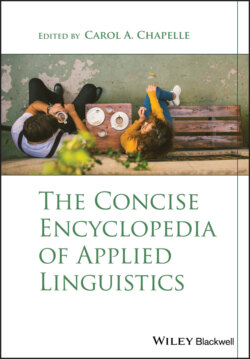Читать книгу The Concise Encyclopedia of Applied Linguistics - Carol A. Chapelle - Страница 43
Conclusion
ОглавлениеThe concept of agency has been appropriated by SLA researchers working from different theoretical perspectives, resulting in various implications for L2 learning and teaching. Within the sociocultural framework, agency refers to one's capacity to act through the mediation of culturally created tools as well as with guidance by more capable others rather than to a property of individual learners. Thus, teachers' and co‐learners' involvement is regarded as crucial in offering mediation—or scaffolding—to learners in their zone of proximal development (Vygotsky, 1997), which will lead to self‐regulation and independence. From an activity theory perspective, learning an L2 is equal to participating in a community, where the L2 mediates the learner's involvement in new activities and in forming new social relationships in the community.
From a poststructural or critical perspective, socially, culturally, and politically engaged forms of L2 teaching that can help learners exercise agency are called for because, as Pennycook (1997) argues, learning a language is more than mastering a system; it is also a matter of “struggling to find means of articulation amid the cultures, discourses, and ideologies within which we live our lives” (pp. 48–9). L2 teaching should therefore “help students become authors of their own worlds” (p. 45).
In a globalizing society, in which people increasingly move around the globe for many different reasons and where information technology brings people together in virtual worlds, people's movements and communication often involve second language learning and the reconstruction of selves. Individuals are not entirely free in how they choose ways of life or identities because they are embedded in social structures that constrain their freedom. Yet, as humans face a variety of choices and constraints, their agency is becoming a key concept for people living in the present world, particularly those who try to craft new identities by learning a second language.
SEE ALSO: Identity and Second Language Acquisition; Motivation in Second Language Acquisition; Vygotsky and Second Language Acquisition
